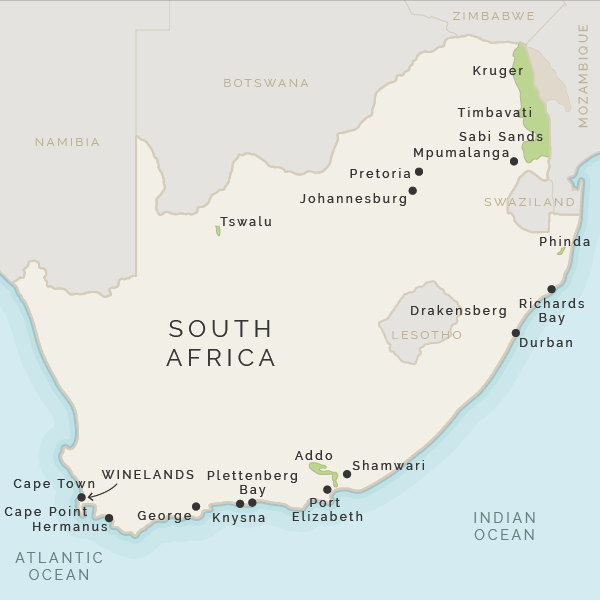Like most of Africa, South Africa is also a year round destination due to its size, regional climates and wildlife viewing prospects.
If you are looking to travel in the Southern part of the country then Cape Town is best during its summer months (British winter) At this time of year the sky is crystal clear and the weather is warm. Observing whales is a popular option for wildlife viewing in Cape Town and the annual migrations can even be seen from shore. The annual migrations however, occur in the winter months (British summer) between June and November with the calving season falling in July and August. This is when Cape Town is generally colder, however this time of year presents wonderful opportunities for observing the whales.
Game viewing in the northern parks is traditionally best done over the winter (June until September) when the climate is cooler and drier. The evenings are chilly but the days are warm and as September progresses into October and November the temperatures start to rise as does the humidity and the liklihood of rain. Between June and September (the dry season), the vegetation is lower and thinner, generally making predators easier to spot. Animals tend to congregate nearer the waterholes and the cooler temperatures mean the animals are active for longer, providing great viewing opportunities.
Game viewing, however can occur all year round. The start of the rains in late October and early November signal the return of the migratory birds. The vegetation is transformed from rusty brown to emerald green and the water supply becomes plentiful. This does tend to make game viewing more tricky, however the contrasting colours are striking for any keen photographer.
Please see our detailed climate charts below
The Best Time to visit Cape Town
If you are looking to travel in the Southern part of the country then Cape Town is best during its summer months (British winter) At this time of year the sky is crystal clear and the weather is warm. Observing whales is a popular option for wildlife viewing in Cape Town and the annual migrations can even be seen from shore. The annual migrations however, occur in the winter months (British summer) between June and November with the calving season falling in July and August. This is when Cape Town is generally colder, however this time of year presents wonderful opportunities for observing the whales.
The Best Time to go on Safari in Africa;
Game viewing in the northern parks is traditionally best done over the winter (June until September) when the climate is cooler and drier. The evenings are chilly but the days are warm and as September progresses into October and November the temperatures start to rise as does the humidity and the liklihood of rain. Between June and September (the dry season), the vegetation is lower and thinner, generally making predators easier to spot. Animals tend to congregate nearer the waterholes and the cooler temperatures mean the animals are active for longer, providing great viewing opportunities.
What is the best time to go on a safari in South Africa;
Game viewing, however can occur all year round. The start of the rains in late October and early November signal the return of the migratory birds. The vegetation is transformed from rusty brown to emerald green and the water supply becomes plentiful. This does tend to make game viewing more tricky, however the contrasting colours are striking for any keen photographer.
The Best Month to visit South Africa
Please see our detailed climate charts below

